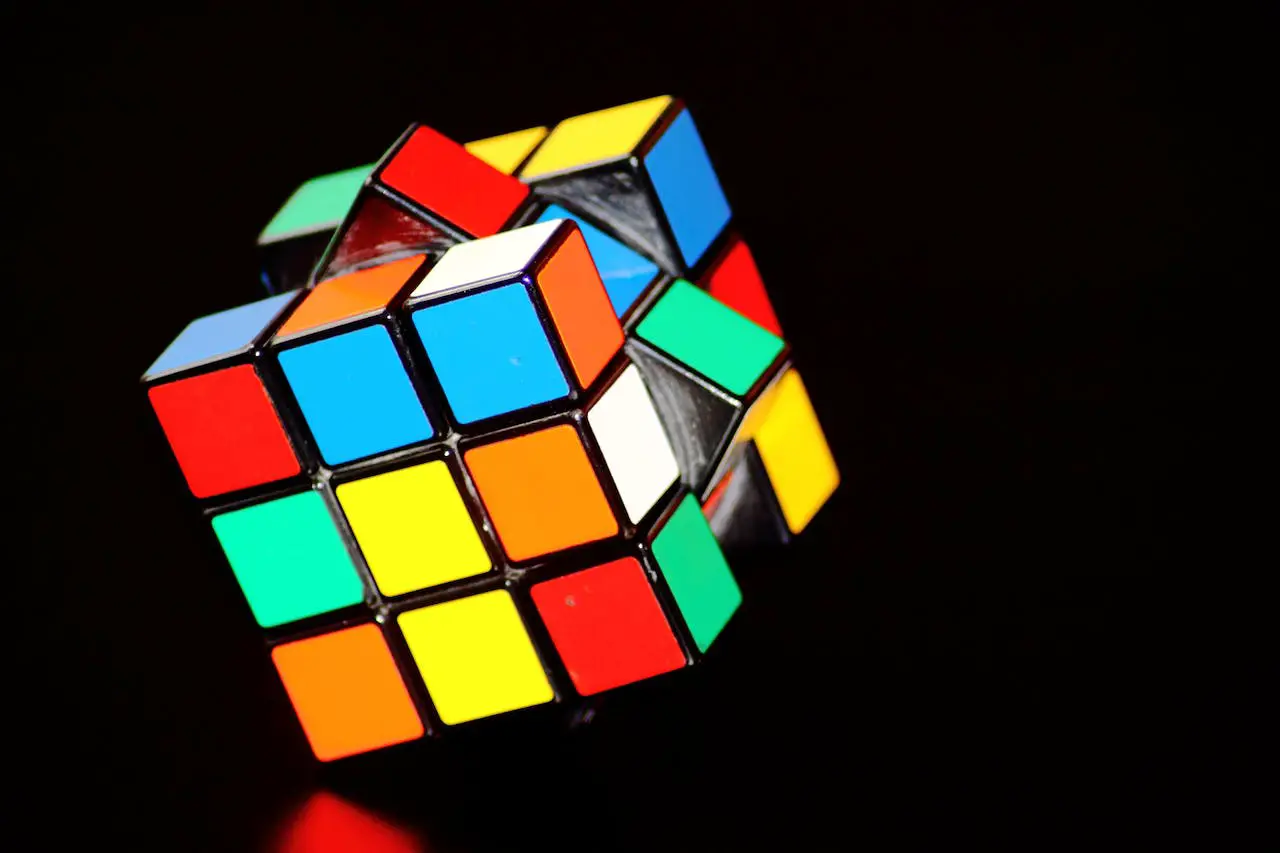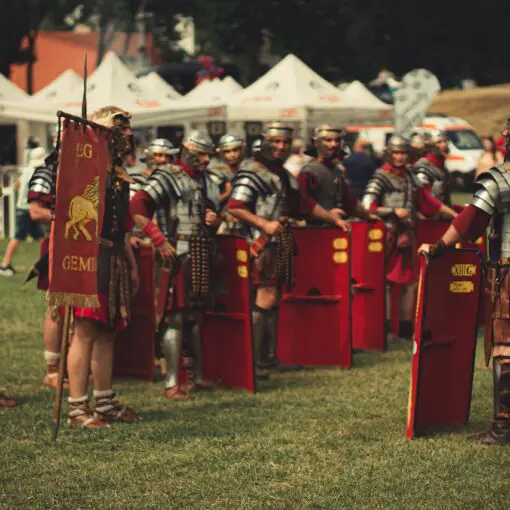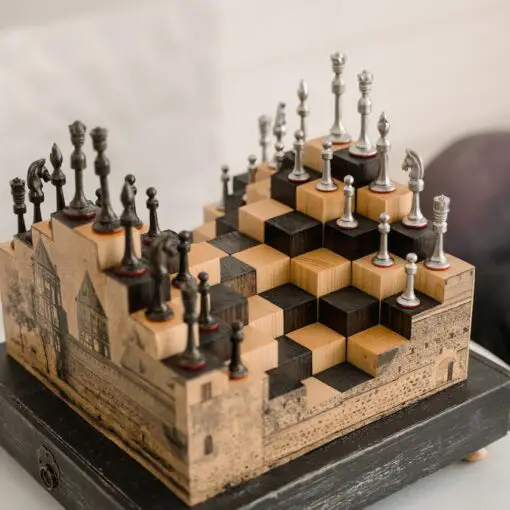Strategic thinking is an essential skill in today’s complex world, allowing individuals to analyze situations, identify patterns, and make informed decisions accordingly. One way to hone this skill is through engaging with puzzles designed to challenge and develop strategic thinking capabilities. Puzzles vary in type and complexity, offering opportunities for individuals at various levels of expertise to improve their cognitive abilities and apply their skills to real-world situations.
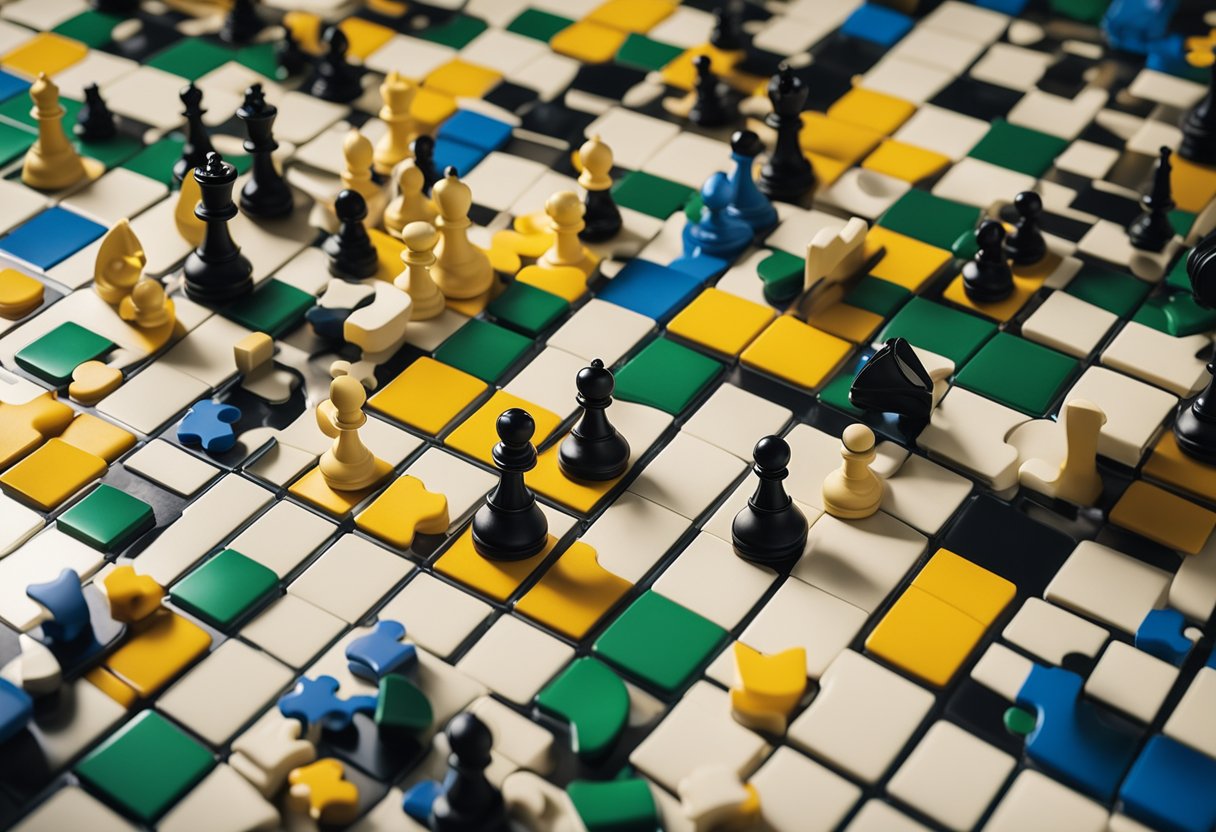
Puzzles for strategic thinking involve a wide range of scenarios, from classic games like chess and Sudoku to more modern and innovative brain teasers. These types of puzzles can be used as educational tools to help learners grasp concepts while also promoting critical thinking and problem-solving skills. Additionally, organizations may leverage strategic puzzles for team building exercises or employee development initiatives, fostering an environment of collaboration and creative thinking.
Key Takeaways
- Puzzles enhance strategic thinking abilities through challenging cognitive tasks
- A variety of puzzle types can be adapted for different learning environments and goals
- Strategic puzzles offer benefits beyond personal growth, such as team building and organizational development.
Some of the best games that help develop strategic thinking include:
- Chess: This classic game requires players to think several steps ahead, making it an excellent tool for enhancing strategic thinking (source).
- Go: A game that involves complex strategic decisions and long-term planning, making it beneficial for developing strategic thinking skills.
- Settlers of Catan: This board game teaches players to manage resources and analyze their decisions, making it a great tool for boosting strategic thinking (source).
- Total War series: Known for its world map strategic big picture thinking, this game can help improve strategic thinking skills (source).
The Role of Puzzles in Enhancing Strategic Thinking
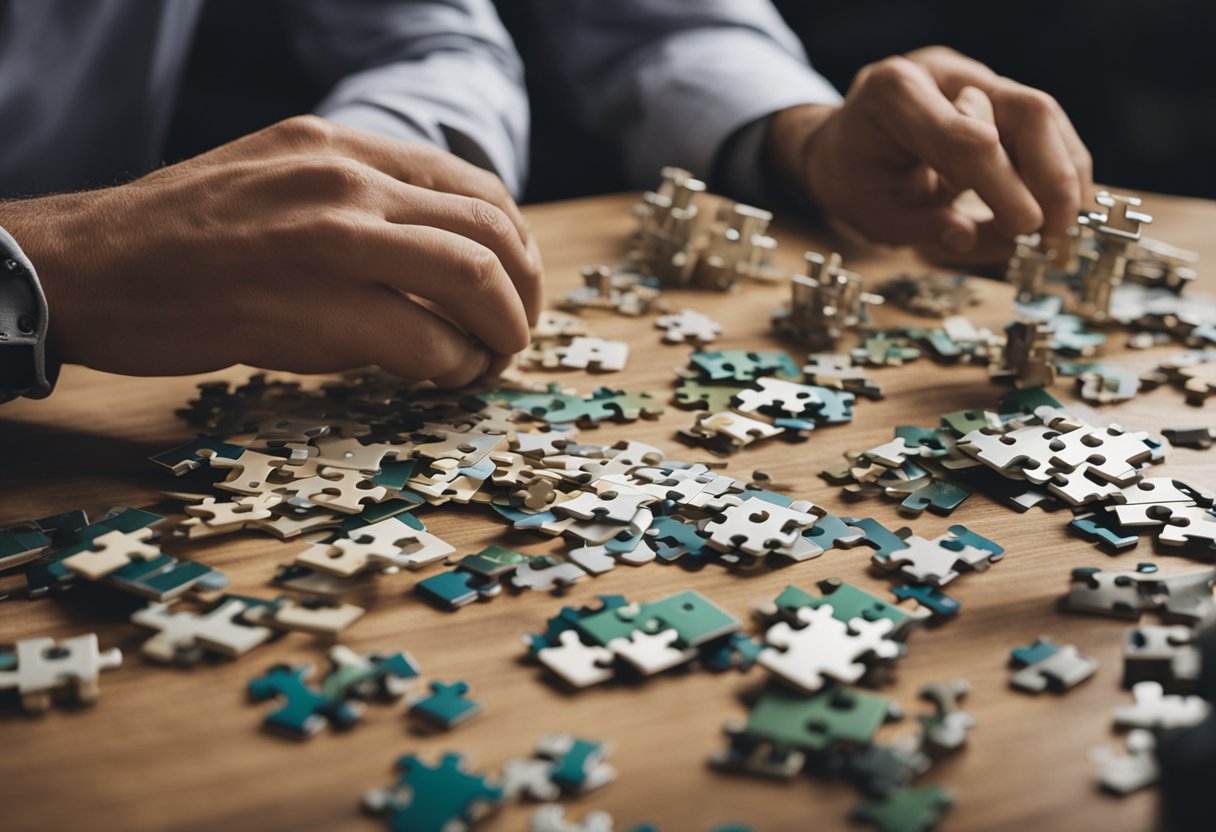
Exploring the Benefits of Puzzles for Cognitive Abilities
Puzzles have long been regarded as an effective tool for enhancing cognitive abilities such as thinking skills, problem-solving skills, and strategic thinking skills. The process of solving a puzzle often involves identifying patterns, making connections, and testing hypotheses. This, in turn, aids in the development of critical thinking and adaptability. Some research claims that playing video games may also improve problem-solving skills and decision-making capabilities.
Puzzles can further aid in nurturing planning abilities, which is a key aspect of strategic thinking. By engaging in puzzles that require foresight and calculated steps, individuals become more adept at anticipating obstacles and evaluating potential outcomes. Consequently, they become better equipped to navigate complex situations both in personal and professional contexts.
Linking Puzzles to Business and Leadership Development
The skills acquired through puzzle-solving can also have significant implications for leadership and management capacities. In a business context, strategic thinking enables leaders to make informed decisions, consider long-term impacts, and tackle new challenges. As mentioned in the Harvard Business Review, an effective way to improve strategic thinking skills is to structure written and verbal communication in a way that helps the audience focus on the core message.
Here are some key puzzle-related activities that can contribute to these skills:
- Crossword puzzles: Enhance vocabulary, effective communication, and information retention
- Sudoku: Improve logical reasoning and pattern recognition
- Chess: Boost strategic planning, decision-making, and adaptability
In conclusion, incorporating puzzles into one’s routine can not only sharpen cognitive abilities but also translate to better leadership and management skills in a professional environment. By promoting strategic thinking, puzzles hold promise for fostering more efficient and innovative business leaders.
Types of Puzzles for Strategic Brain Training
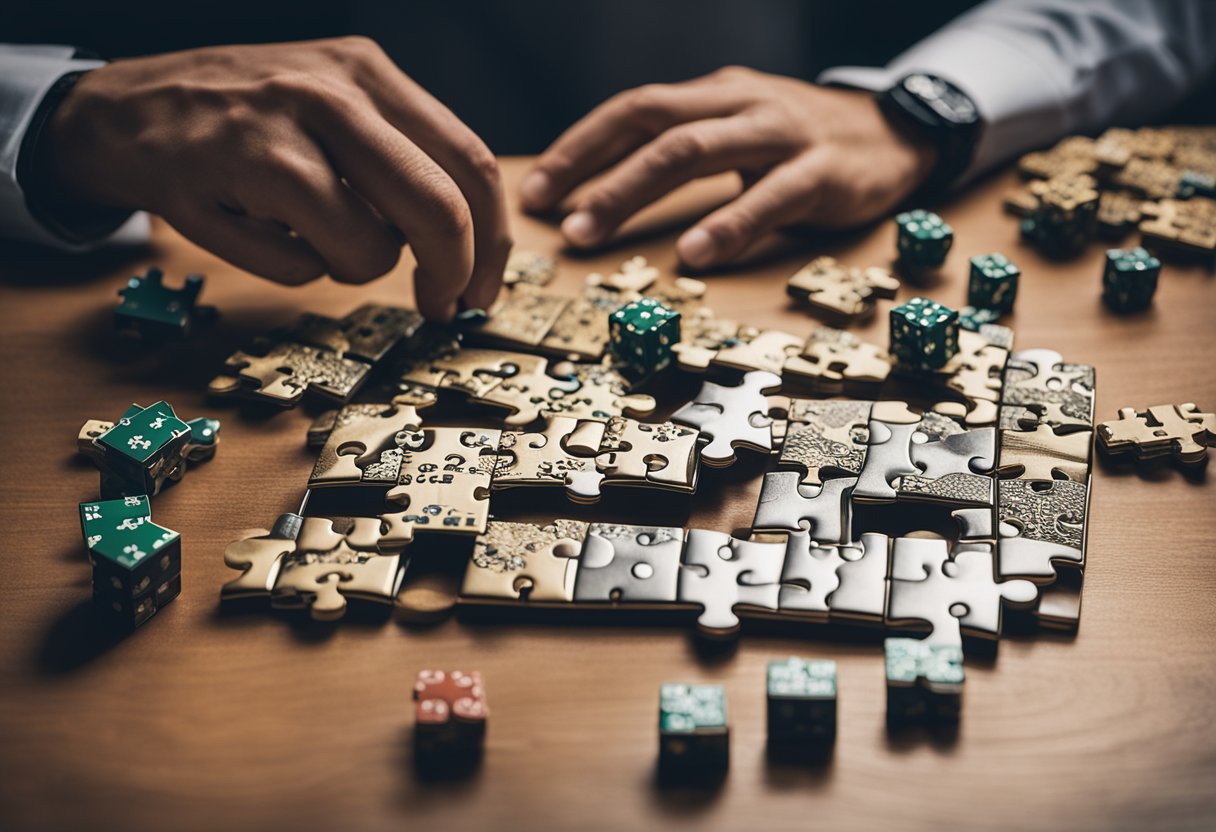
Classic Strategic Games Like Chess and Monopoly
Chess and Monopoly are two classic strategic games that have been enjoyed for centuries. Chess is a two-player strategy board game that embodies various elements of critical thinking, such as forethought, problem-solving, and intuition. Playing chess regularly can help improve strategic thinking and cognitive abilities. Monopoly is a popular board game that involves negotiation, resource management, and financial planning. This classic game can teach valuable lessons in strategy and decision-making. Both chess and Monopoly offer timeless entertainment and valuable cognitive benefits.
Modern Puzzle Games: From Sudoku to Lumosity
In recent years, there has been a surge in the popularity of modern puzzle games like Sudoku and Lumosity. Sudoku is a number-placing puzzle that engages the analytical and logical side of the brain. It challenges players to organize numbers logically, enhancing problem-solving and reasoning skills. Lumosity is an online platform offering various brain-training games designed by neuroscientists. These games are tailored to improve cognitive skills, such as memory, attention, flexibility, and problem-solving. Incorporating modern puzzle games like Sudoku and Lumosity into your daily routine can significantly contribute to strategic brain training.
The Emergence of Online Puzzle Resources
With the continual growth of the internet, online puzzle resources have emerged as valuable tools for brain training and cognitive development. These online resources offer various brain games and puzzles that cater to a wide range of interests, from critical thinking challenges to interactive strategy games. Online platforms provide endless opportunities for individuals to sharpen their strategic thinking skills at their convenience. Examples of online puzzle resources include mobile apps, tactical thinking puzzles, and resources that offer participants opportunities for deep analysis and problem-solving. As technology continues to advance, the internet has become an invaluable resource for accessing strategic brain training puzzles and staying mentally engaged.
Designing Puzzles for Strategic Thinking Development
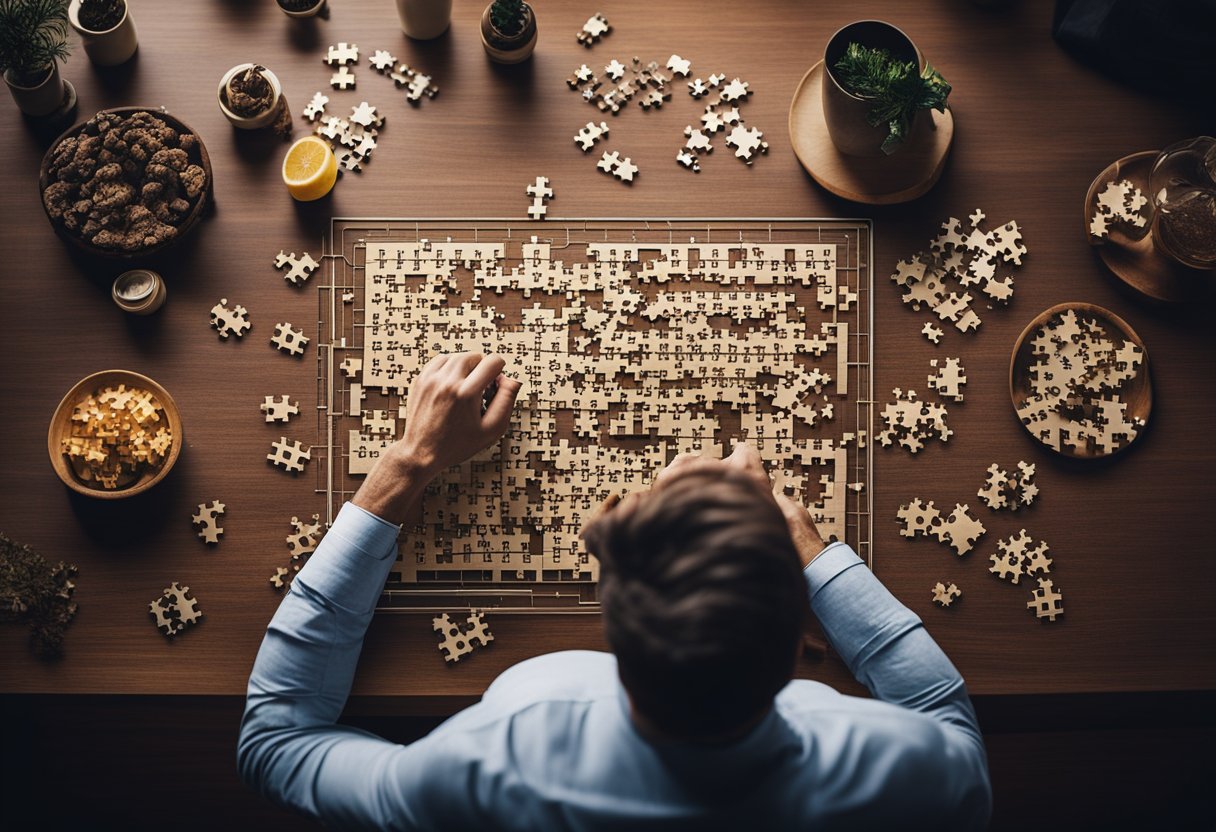
Elements of Puzzle Creation for Strategic Skills Enhancement
The process of designing puzzles for strategic thinking development involves fostering creativity, innovation, and problem solving. Incorporating various elements in puzzle creation can produce unique challenges that help to enhance strategic skills.
Some essential elements to consider include:
- Levels of difficulty: Design puzzles with varying levels of complexity to cater to diverse thinking abilities and challenge progression.
- Multiple solution paths: Encouraging creative thinking by providing multiple ways to solve a problem.
- Constraints: Setting limitations on resources and time creates a problem-solving atmosphere that challenges the user’s strategic thinking abilities.
- Collaboration: Puzzles designed for group work can facilitate team building and promote shared decision-making.
Taking these factors into account helps to create puzzles that encourage strategic thinking and creative problem-solving, ultimately leading to skills development.
The Intersection of Creativity and Strategy in Puzzle Design
Designing puzzles to develop strategic thinking involves finding a balance between creativity and strategy. Creative and innovative ideas must be incorporated into puzzle designing so that they provide a platform for users to practice strategic thinking.
Some practical tips for incorporating creativity in strategic puzzles are:
- Concept Innovation: Experiment with new and original puzzle ideas, breaking away from traditional formats.
- Visual Design: Use visual elements like colors, patterns, and shapes to enhance user engagement and motivation for strategic thinking.
- Storytelling: Implement narratives and characters that provide context and meaning to the puzzles, making them more engaging for users.
Integrating creativity and strategy in puzzle design can lead to effective and engaging puzzles that facilitate strategic thinking development, problem-solving, and creative exploration. By constantly refining and iterating the puzzle creation process, designers can ensure that their puzzles always offer new challenges and engaging scenarios for users to explore and solve, ultimately promoting the development of strategic thinking skills in their audience.
Puzzles as Educational Tools and Learning Enhancers
Advancing Education through Strategic Puzzle Integration
Puzzles can be a powerful way to enhance education and learning. By introducing puzzles into training sessions and classroom activities, educators can promote strategic thinking and problem-solving skills. According to a study on crossword puzzles as educational tools, these games are particularly effective when the questions are extracted from the content of the same day or previous sessions. This approach ensures that the puzzles are both relevant and engaging.
There is a wide array of puzzle types that can be integrated into an educational setting. For instance, Rush Hour, an award-winning solo play game, challenges students to strategically place puzzle pieces in order to solve a traffic jam. With 200 puzzles to solve, learners can spend hours building their strategic thinking and problem-solving skills.
Collaboration and Learning in Puzzle-Based Environments
In addition to fostering individual learning, puzzles can also encourage collaboration and team-building. When working together to solve a puzzle, students improve their communication, cooperation, and knowledge sharing skills. This collaborative environment can be particularly beneficial during group training sessions, where peers can learn from one another.
One way to encourage collaboration is through the use of layered puzzles, which gradually increase in complexity as learners progress. By starting with basic concepts and adding more advanced elements, participants can see their progress and work together to achieve a common goal.
Another effective strategy is to incorporate game-based learning into educational environments. A study conducted among sixth grade students found that using logical thinking games significantly improved creativity and learning attitude.
In conclusion, integrating puzzles and games into education and training sessions can lead to greater knowledge acquisition, improved strategic thinking, and enhanced collaboration. By carefully selecting and incorporating relevant puzzles, educators can create more engaging and dynamic learning experiences for their students.
Difficulty and Complexity in Strategic Puzzle Selection
From Simple Crosswords to Complex Problem-Solving Challenges
Selecting the right strategic puzzle should consider the difficulty and complexity of the challenges. At one end of the spectrum, we have simple crossword puzzles that test the individual’s knowledge, language abilities, and pattern recognition skills. Crosswords can be enjoyable, engaging, and accessible; serving as an excellent introduction to strategic thinking.
As we move toward more complex problems, the mental gymnastics required gradually escalates. One example of advanced strategic puzzles is logic grid puzzles. These types of challenges demand participants to deduce information from context, practice deductive reasoning, and work flexibly with different types of information in a systematic approach.
Strategic puzzles’ complexity and their requirements might vary. Still, they typically share certain features that contribute to their difficulty:
- Multiple variables: Complex problems usually involve many interrelated factors.
- Dynamic environment: Puzzle elements can change and evolve, making the puzzle feel “alive.”
- Non-linear solutions: The answer or pattern is not always immediately apparent, demanding critical evaluation and creative thinking.
Adapting Challenge Levels to Different Thinking Styles
Each person has their unique thinking style, influencing how they approach and solve puzzles and challenges. To accommodate various styles, strategic puzzles can be adapted and tailored to match the solver’s strengths and areas for growth. Here are some strategies to customize puzzles:
- Modify the puzzle format: Present the challenge in a way that benefits the solver’s cognitive inclinations, such as visual aids for visual learners.
- Adjust puzzle scope: Scale the complexity of the puzzle to match the solver’s skill level by altering the number of variables or solution options.
- Emphasize specific skills: Create variations of a puzzle to emphasize different cognitive skills, such as analytical thinking, creativity, or memory recall.
- Establish time limits: Establishing flexible time limits allows solvers to challenge themselves at their own pace, ensuring puzzles remain engaging and stimulating without causing undue frustration.
In conclusion, the optimal strategic puzzle selection considers the complexity and challenge level to suit different thinking styles. By maintaining a balance between difficulty and flexibility, solvers can expand their cognitive abilities while engaging in enjoyable, thought-provoking activities.
Puzzles in the Context of Real-World Strategic Scenarios
Problem-Solving in Business and Real-Life Situations
In the context of business and real life, problem-solving skills are more critical than ever. Strategic thinking involves the ability to look at situations from different angles and consider multiple alternatives. Puzzles that challenge your critical thinking skills, such as lateral thinking puzzles, can help improve these essential abilities.
One way puzzles can be helpful in real-world scenarios is through applying the concept of resource allocation. For instance, solving puzzles often requires efficient use of resources, such as time, space, and logical steps. This parallels with business decision-making, where resources like money, human effort, and materials must be allocated effectively to achieve desired outcomes.
Transferable Skills from Puzzles to Everyday Challenges
When tackling puzzles, individuals develop a range of strategic thinking skills, such as planning skills and problem-solving techniques. These skills are highly transferable to everyday challenges, including professional and personal scenarios. For example, Mind Bender puzzles sharpen geometry and creative thinking, which can be applied in designing solutions or strategies in a business context.
Additionally, puzzles can help improve decision-making under pressure, as most strategic thinking games require players to make informed choices while accounting for various factors and potential outcomes. This skill is useful in real-world scenarios, where quick, yet well-thought-out decisions are necessary for success.
Moreover, some puzzles specifically target critical thinking, like these examples, which cover varying topics from letter puzzles to commonalities and differences. Engaging in these types of puzzles provides an opportunity to practice strategic thinking in a risk-free environment, which can then be transferred to real-world situations.
In conclusion, puzzles offer a unique and entertaining way to develop and enhance strategic thinking skills necessary for everyday life and business challenges. By engaging with various types of puzzles, individuals can effectively practice and transfer these crucial abilities, honing their problem-solving competencies in various real-world scenarios.
Cognitive Benefits of Regular Puzzle Engagement
Impact of Puzzle Solving on Memory and Focus
Engaging in puzzles regularly, such as crosswords, Sudoku, and brain teasers, can have significant positive effects on one’s cognitive abilities. These activities require the use of a variety of cognitive skills, including critical thinking, problem-solving, and memory recall1. By challenging yourself with puzzles, you are essentially exercising your brain, which in turn improves memory and focus.
In addition, puzzles also foster concentration and planning abilities. To solve a puzzle, you need to stay focused on the task at hand and often plan out a strategy to reach the solution. As you progress through more challenging puzzles, these cognitive skills are further sharpened, leading to better overall mental performance2.
Puzzles as Preventative Tools Against Cognitive Decline
Interestingly, puzzle-solving activities may also play a role in preventing cognitive decline, particularly in older adults. Studies have shown that engaging in puzzles can promote brain health and lower the risk of developing conditions like Alzheimer’s disease and dementia3. Furthermore, puzzles have been found to be beneficial in improving short-term memory, which is known to decline with age4.
In addition to the cognitive benefits mentioned, puzzles also offer a relaxing and enjoyable way to unwind. The combination of mental engagement and relaxation makes puzzles an invaluable tool for maintaining and improving brain health. By incorporating puzzles into your daily routine, you are not only sharpening your thinking skills but also helping to ensure long-term cognitive well-being.
Leveraging Puzzles for Team Building and Organizational Growth
Fostering Collaboration and Team Dynamics Through Puzzles
Puzzles are an excellent way to foster collaboration and team dynamics within an organization. They inherently require logical thinking and problem-solving skills, allowing team members to develop critical competencies that are applicable in their work environment. Some popular team-building activities that involve puzzles include escape rooms and jigsaw puzzles.
Working on puzzles together encourages employees to communicate effectively and collaborate in order to solve challenges. This, in turn, helps build a positive and supportive team environment, enhancing overall organizational growth. Puzzles also instill a sense of achievement and camaraderie among team members, further promoting a healthy workplace culture.
Strategic Puzzles as Metaphors for Organizational Challenges
Custom puzzles that resonate with an organization’s objectives can serve as strategic metaphors for the challenges a company faces. These tailored puzzles encourage teams to work together and develop creative solutions for real-world problems, thus enhancing their management skills.
For example, creating a puzzle that mirrors a complex project or process within the organization can help employees understand the interdependencies among various aspects of the project, increasing their ability to strategize and plan accordingly. In the process of solving the puzzle, team members learn to identify potential bottlenecks and risks, improving their decision-making abilities and ultimately contributing to the organization’s success.
By incorporating puzzles that promote strategic thinking and collaboration into team-building exercises, organizations can cultivate a workforce equipped to navigate challenges and contribute to growth.
Choosing the Right Puzzles for Different Learning Environments
Educational Institutions vs. Corporate Training Sessions
In educational institutions, strategic thinking puzzles can be used as an engaging tool for teaching critical thinking skills to students. These puzzles can vary from logic puzzles to spatial challenges, all aiming to cultivate a problem-solving mindset in students. On the other hand, corporate training sessions often focus on improving employees’ decision-making abilities and fostering long-term strategic planning. In this context, advanced strategic thinking exercises become more relevant as they challenge professionals to analyze complex problems and propose effective solutions. For example, Puzzle Planet offers a variety of puzzles that can be tailored for use in different learning environments.
Customizing Puzzle Content for Targeted Strategic Outcomes
To maximize the benefits of using puzzles in various learning environments, it is important to customize the content based on the targeted strategic outcomes. In education, the focus should be on providing puzzles that foster creative thinking and problem-solving.
Here are a few examples of puzzles for educational environments:
- Logic puzzles: Require students to deduce a solution using their reasoning abilities.
- Spatial challenges: Enhance students’ ability to visualize and manipulate objects in their minds.
- Pattern recognition: Encourage students to identify trends and develop prediction skills.
For corporate training sessions, puzzles need to address specific objectives, such as decision-making, risk assessment, and resource allocation.
Some examples of puzzles for corporate training sessions include:
- Scenario planning exercises: Challenge employees to think through various potential situations and develop appropriate strategies.
- Pre-mortem analysis: Encourage participants to imagine a project’s failure and identify its root causes, helping them to develop a proactive approach to mitigating risks (Growth Tactics).
- Resource allocation games: Require employees to efficiently allocate resources under constraints to enhance their planning and optimization skills.
Customizing puzzle content ensures that the learners can obtain the most benefits from strategic thinking exercises, whether they are students or professionals. By matching the puzzles to the desired outcomes, educators and trainers can effectively enhance participants’ abilities in various learning environments.
Future of Strategic Puzzles and Technology Integration
Tech Advances and Their Impact on Puzzle-Based Learning
As our world becomes increasingly dependent on technology, we are witnessing a significant impact on various fields, including puzzle-based learning. Emerging technologies such as machine learning, cloud-based platforms, and virtual reality are changing the way people approach and solve puzzles.
Machine learning provides opportunities for puzzles to adapt and cater to a player’s skill level. As an individual solves puzzles, the algorithms can analyze their performance and offer more challenging or tailored problems based on their abilities. This approach ensures that players are continuously engaged and never feel stagnant in terms of mental stimulation.
Cloud-based platforms enable users to access puzzles from anywhere and share their progress with the community. Puzzles are no longer limited to traditional physical formats such as books or boards. For example, people can engage in strategic thinking exercises for professionals through e-learning platforms designed to enhance strategic thinking skills.
Virtual reality brings a new level of immersion to the puzzle-solving experience. Users can now enter fully interactive and engaging environments in which they can manipulate objects and explore various solutions in ways previously not possible.
Innovative Approaches to Puzzle Design and Distribution
Innovation in puzzle design and distribution has been fueled by technology. One such example is the use of augmented reality (AR) in creating immersive puzzle gaming experiences. AR apps offer a combination of real-world environments with virtual elements, providing a unique strategic challenge for users. By overlaying virtual components on a physical space, puzzle enthusiasts can exercise their problem-solving skills in a modern, engaging setting.
Gamification, another trend, has led to the creation of puzzle-based applications that merge entertainment and education. These apps aim to make learning enjoyable while still challenging the user’s strategic thinking abilities.
Digital distribution has disrupted the traditional puzzle market, granting designers easier access to their audiences. This shift means a wider variety of puzzles are readily available to consumers, ushering in a new era of accessibility and diversity. Popular platforms, such as app stores and online repositories, house a myriad of puzzle types, catering to all levels and interests.
The future of strategic puzzles and their integration with technology promises even more innovation and engagement, as developers continue to refine their designs and make use of emerging technologies. Puzzle enthusiasts can expect a combination of novel experiences, enhanced learning, and enriching mental challenges as the industry evolves.
Conclusion
The Enduring Value of Puzzles in Strategic Thinking Growth
Puzzles have long been recognized as an effective way to develop strategic thinking skills. They often require individuals to analyze complex scenarios, identify patterns, and anticipate potential outcomes with a long-term perspective. By regularly engaging with puzzles, one can enhance their problem-solving abilities and critical thinking skills, enabling them to tackle various challenges in both their personal and professional lives.
The 20 Essential Strategic Thinking Exercises for Maximum Impact and the 7 Puzzles to Challenge Your Critical Thinking mentioned earlier, for instance, are designed with the purpose of facilitating the growth of strategic thinking.
Final Thoughts on Choosing and Utilizing Strategic Puzzles
When selecting puzzles to improve strategic thinking, it is important to ensure that they are both engaging and challenging. A good puzzle should:
- Trigger the brain to think critically and creatively.
- Be relevant to the desired skill set, such as planning, analysis, decision-making, pattern recognition, or foresight.
- Offer an opportunity for reflection, refinement, and learning from mistakes.
Moreover, it is essential to practice puzzles regularly and consistently. Persistent engagement with these exercises helps your brain develop a learning habit, which ultimately solidifies the strategic thinking skills you acquire along the way. To get the most out of strategic puzzles, consider incorporating them into your daily routine, and explore a variety of puzzle types, ensuring a well-rounded development of your strategic thinking abilities.
In conclusion, puzzles are a valuable tool for growing strategic thinking skills. When chosen and utilized correctly, they can help individuals overcome cognitive biases, develop critical thinking, and improve their decision-making abilities.
Footnotes
- (https://www.coreveinternational.org/post/what-benefits-do-puzzles-have-for-cognitive-development) ↩
- (https://www.ask.com/lifestyle/enhance-critical-thinking-skills-daily-engagement-puzzles) ↩
- (https://www.wonderfun.io/a/blog/post/brain-teasers-the-ultimate-guide-to-the-benefits-of-solving-jigsaw-puzzles) ↩
- (https://odysseyfinepuzzles.com/the-benefits-of-puzzles-why-they-are-important-for-cognitive-development) ↩

